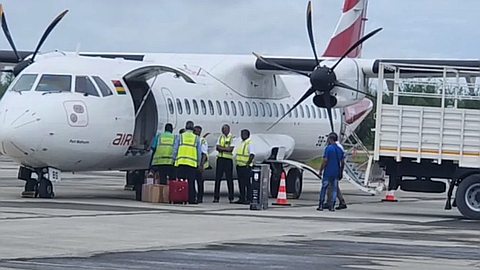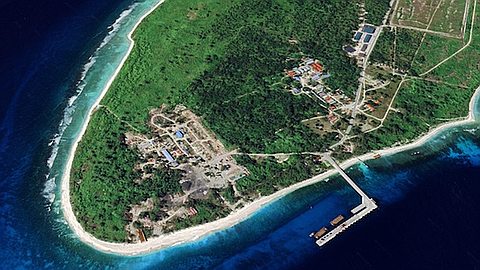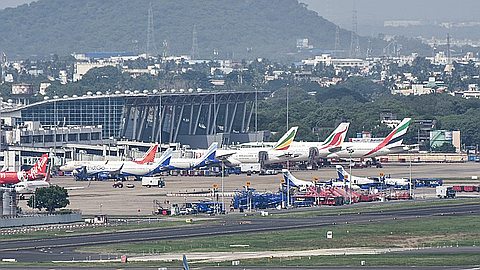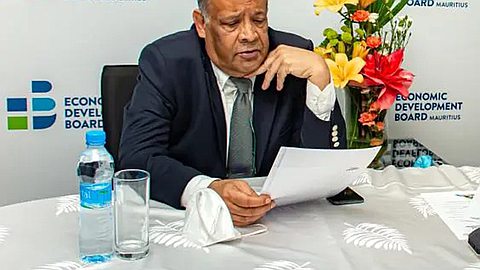India Looks to Increase Economic Engagement
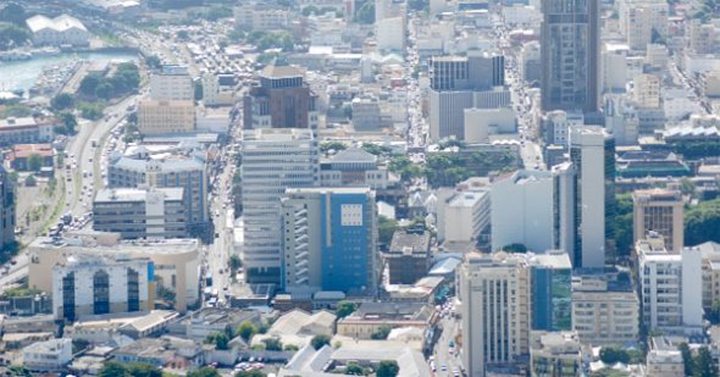
India, a long-standing partner of Mauritius in development, unveiled the package during bilateral talks between PM Dr Navin Ramgoolam and his Indian counterpart Manmohan Singh in New Delhi. The line of credit is the largest amount given to Mauritius. “The total amount of lines of credit that India has offered to Africa as a whole works out to be about $500 million in addition to what has been offered to Mauritius,” informed the Indian high commissioner to Mauritius, T P Seetharam.
“It can be used either simply to import something or it can be utilised for machinery which can lead to value addition here, and products so generated can be exported to India, since it is a huge market, or to Africa or anywhere else. And that would generate an economic activity and employment,” he said.
“We hope this works as a catalyst to dramatically increase our economic activity because although India is right now the largest trading partner of Mauritius, the main item on that list is petroleum which is coming from India. If that is taken out, there are imports for textile industry and pharmaceuticals.” “The exports from Mauritius is ‘iron and steel’ to the tune of $17 million only, and this is mostly scrap!” Five MoUs were also signed in the fields of education, textiles, sports and youth affairs, science and technology and culture between the two nations in February.
Another key development was the renewal of talks for the double taxation avoidance agreement (DTAA), with both nations stressing that they have an interest in ensuring it is not misused.
A month after the reveals, the high commissioner of India speaks with The Independent on how things are expected to take shape now. Barely six months into his new profile, the high commissioner, who took office in September last year, has his hands full already. The state visit of the highest level to India came on the heels of another high level visit to the island by the Indian minister of New and Renewable Energy Farooq Abdullah in January. End of 2011 saw the India-Mauritius Joint Working Group meeting in Port Louis after three years to discuss the DTAA.
Seetharam was born in 1956 in southern Indian coastal state Kerala. He did his postgraduate degree in English literature from the Madras Christian College, Chennai. Since joining the Indian Foreign Service in 1980, he has served in Indian diplomatic missions and posts in Hong Kong, Lusaka, Windhoek, Beijing, Phonm Penh, Johannesburg, Cape Town, Geneva and Bangkok.
In Delhi, he has worked in the Indian Council for Cultural Relations, served as press secretary to the President of India, and most recently handled India’s bilateral relations with countries in Europe as well as with the European Union. He is married and has a son and a daughter.
Excerpts from the interview:
What is the latest on the $250 million line of credit? The funds from 2005 $100 million line of credit have not been used up totally. Is there a timeline for the disbursement?
The line of credit of $250 million was announced during the Mauritian Prime Minister’s visit to India, now we have to start operationalising it. I’ve already written to the Mauritian government so that we can begin identifying projects and priorities for which it will be utilised. But that process is something that has to be done by the Mauritian side. We have made available the broad guidelines which have been drawn up for such lines of credit (only condition being that the projects and products are sourced from India and 75 per cent of the value of the project has to come from India, rest could be local elements and contributions). Now we will wait for the Mauritian side to determine priorities, it doesn’t have to be done all at one go, it can be done gradually.
There’s no timeline, of course we hope it is used as soon as possible. The terms, decided by Mauritius, are quite liberal. Although Mauritius is a middle income country and therefore qualifies for such lines of credit, a special case has been made by offering better terms than would be normally entitled for a middle income nation in terms of interest rate and repayment period. Now we will sit together and see how soon Mauritius can identify the needs and once it is done, we would process it as quickly as possible.
What are the possible ways of using the line of credit?
One simple way to use it would be to buy machinery, equipment or even trucks and buses from India. It has to be processed and recommended by the Ministry of Finance. That would be very quick in terms of disbursement, but if it is a larger infrastructural project then it would take a little longer. First you have to work out a feasibility study which is sent to us for projects. Then if you don’t have local expertise for complex projects then there is a provision wherein we can arrange to send experts from India under this line of credit or the grant.
For instance, during the visit of the PM, Enterprise Mauritius had arranged an exhibition in Mumbai with high end textiles and I believe there were serious enquiries and chains have shown interest in procuring such high value textile items. India is a manufacturer of garments, but Mauritius has certain high quality niche products since it is used to supplying to Europe.
In today’s globalised world, it is not that you should have everything here in order to produce something. You have an IT industry and a financial sector with experts that can put together such projects. There are things happening now that will increase the level of economic interaction between India and Mauritius and we hope this line of credit will play a catalyst role.
Any updates on Indo-Mauritius DTAA?
Two things have happened recently, and both are good.
In December, there was a delegation from India for a Joint Working Group, Ministry of Foreign Affairs from Mauritius and Ministry of External Affairs from India, which was held after a gap of three years, the last time they had met was in 2008. Since there was a long gap where the two governments did not sit down to address certain issues that have cropped up, there was wide speculation and some exaggerated reports that led to certain perceptions which had a negative impact on the whole arrangement.
But at the same time, there is no denying that there were issues and concerns that needed to be addressed. There was a feeling that at some level there was misuse, not that everything about it is wrong. And there is a feeling in India that we need to address this misuse for which some corrective steps have to be taken, plug loopholes, if any, that allow such misuse. The December meet was very positive, and we agreed that we have to find a win-win agreement. In that spirit, the Indian side expressed their concerns and we also suggested ways and means to address them.
The second good thing that has happened is that after this, during the visit of the Mauritian Prime Minister to India, this was discussed at the political level between the two Prime Ministers. This has taken it to the highest level possible, and as the joint statement issued thereafter says, the two nations are working towards a mutually agreeable solution. In response to the discussions in December, some suggestions have been made, now the experts will be looking into the options.
These will be addressed in the next round of the Joint Working Group, for which no date has been fixed as yet but we will look at the Mauritian side to suggest dates at the earliest now.
Another positive thing that has happened is that apart from tax, there are several other issues that need to be discussed trade and investment and so on that was discussed under a different framework in the past. We have a Joint Commission (as opposed to the JWG which is specifically for the DTAA) at the ministerial level which is headed by the Finance minister from Mauritius, on our side it is the minister of External Affairs. It was agreed that this commission should meet again within this year in India. The last time it had met was in 2007.
Mauritius Tourism is targeting 100,000 Indian arrivals by 2015. What plans does India have in a similar exercise targeting Mauritian tourists to India? Besides the PIO and OIC facilities, many Mauritians talk of the visa on arrival facility that this country gives to tourists, is a similar gesture forthcoming from India?
We should be targeting much more than we are. That is one of the things we will do this year. We have a tourism promotion office in South Africa and I’m afraid they have not done much here. We are in touch with them to come here and promote India as a tourism destination. I think there is a huge potential, people are genuinely interested, we have special links, but far more people from Mauritius should be visiting India.
Meanwhile, Indians are travelling much more. In the olden days Indians only went to places where they had friends and relatives and stayed in their homes. But not anymore. The young Indians are using their credit cards to travel and looking for all kinds of destinations beyond the standard tourist haunts. Yes, Mauritius is a costlier destination. It is unfortunate that none of the Indian airlines are flying to Mauritius at the moment. Many of our airlines are facing crisis, when the difficult phase settles down, you can see Indian carriers flying here. Air Mauritius is operating six flights at the moment, and is looking to add one more with a few corrections in the Bangalore route. However, they have licence to fly 15 flights to India at the moment.
The 100,000 figure is a very modest target, one can achieve much more with promotions.
The Mauritian PM raised the question of visa on arrival. India has recently started providing this facility to some countries on a trial basis, I’m sure this nation too will be considered in the future for this facility.
During Indian minister for new and renewable energy Dr Farooq Abdullah’s visit to Mauritius earlier this year, he spoke of assistance in renewable energy projects. Has anything materialised out of that at the government level?
We already sent two experts who conducted a workshop on solar power, it had gone very well. There will be follow ups either with future interactions or companies coming here for this. On the wind energy side, we again had experts from India to come and train here. Now Suzlon has entered the market with a Mauritian partner, PadGreen into this sector. I believe there are Indian companies looking at thermal power projects up to 100 MW. About eight per cent of India’s energy requirements comes from renewable sources so we have a lot of activity in this sector.
At the March 9 Science and technology ministers conference in India (attended by minister of tertiary education, science, research and technology Rajesh Jeetah), Indian minister Vilasrao Deshmukh was quoted saying India, Africa will collaborate in social entrepreneurship, innovation. What does it spell for Mauritius?
During the PM’s visit, one of the MoUs signed was on science and technology cooperation and another was on education. If you combine these two, there is so much we can do. Take for instance renewable energy. We need to do much more in research and development field as well. This is an area which Mauritius can develop, because you have high educational achievement of people it is possible to go into innovation and research. It is all about knowledge industry, you don’t need a lot of people for this. In India there is a great emphasis on this. One example is the IIT proposal wherein collaborative courses are being worked out with Mauritius.
Another example is desalination. The National Institute of Ocean Technology in Chennai has developed a desalination plant using the difference in temperature between the water on the surface and that in the depth to produce potable water. So the cost of producing drinkable water is considerably reduced. We have built these plants already in our islands in India. Somebody from Mauritius can go and have a look at these to see how economical it is compared to conventional plants and the institute will be very happy to transfer technology. This is another thing that can be done under the line of credit.
